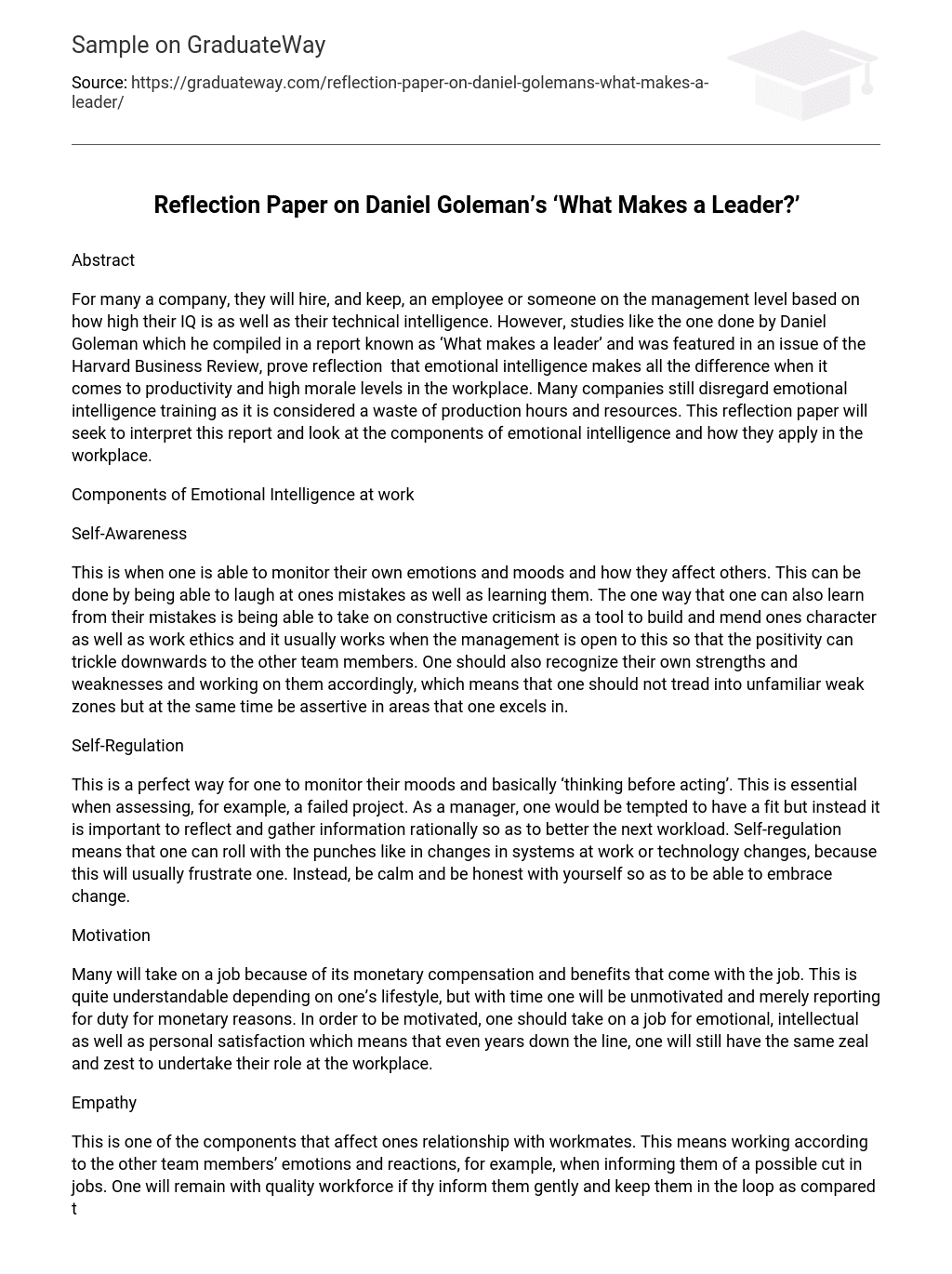Abstract
For many a company, they will hire, and keep, an employee or someone on the management level based on how high their IQ is as well as their technical intelligence. However, studies like the one done by Daniel Goleman which he compiled in a report known as ‘What makes a leader’ and was featured in an issue of the Harvard Business Review, prove reflection that emotional intelligence makes all the difference when it comes to productivity and high morale levels in the workplace. Many companies still disregard emotional intelligence training as it is considered a waste of production hours and resources. This reflection paper will seek to interpret this report and look at the components of emotional intelligence and how they apply in the workplace.
Components of Emotional Intelligence at work
Self-Awareness
This is when one is able to monitor their own emotions and moods and how they affect others. This can be done by being able to laugh at ones mistakes as well as learning them. The one way that one can also learn from their mistakes is being able to take on constructive criticism as a tool to build and mend ones character as well as work ethics and it usually works when the management is open to this so that the positivity can trickle downwards to the other team members. One should also recognize their own strengths and weaknesses and working on them accordingly, which means that one should not tread into unfamiliar weak zones but at the same time be assertive in areas that one excels in.
Self-Regulation
This is a perfect way for one to monitor their moods and basically ‘thinking before acting’. This is essential when assessing, for example, a failed project. As a manager, one would be tempted to have a fit but instead it is important to reflect and gather information rationally so as to better the next workload. Self-regulation means that one can roll with the punches like in changes in systems at work or technology changes, because this will usually frustrate one. Instead, be calm and be honest with yourself so as to be able to embrace change.
Motivation
Many will take on a job because of its monetary compensation and benefits that come with the job. This is quite understandable depending on one’s lifestyle, but with time one will be unmotivated and merely reporting for duty for monetary reasons. In order to be motivated, one should take on a job for emotional, intellectual as well as personal satisfaction which means that even years down the line, one will still have the same zeal and zest to undertake their role at the workplace.
Empathy
This is one of the components that affect ones relationship with workmates. This means working according to the other team members’ emotions and reactions, for example, when informing them of a possible cut in jobs. One will remain with quality workforce if thy inform them gently and keep them in the loop as compared to scaring them with the news because this is when top workers will leave and take their new found knowledge with them. Empathy teaches one to understand varying cultures and world communities because of their varying ethics.
Social Skills
This does not mean befriending everyone as it will compromise fair decision making, but it means getting along with everyone so as to enable building future networks with them. Sometimes one will be mistaken for not working due to chatting and laughing with workmates, but it is important to not alienate the workers. In this way it will be easy to build teams and work for positive changes in the workplace.
Emotional intelligence is nurtured and takes time to achieve so do not lose hope when a bump on the road comes along. Patience and perseverance make all the difference when striving to learn how to get along with workmates and building a positive working environment from the senior offices down to the mailroom. One should not dismiss the emotionally intelligent as they may be key in building ones business as many of them are considered ‘weak’.
References
Goleman, D. (1998, November-December). How To Make A Leader. Harvard Business Review, November-December 1998, 93-102.





